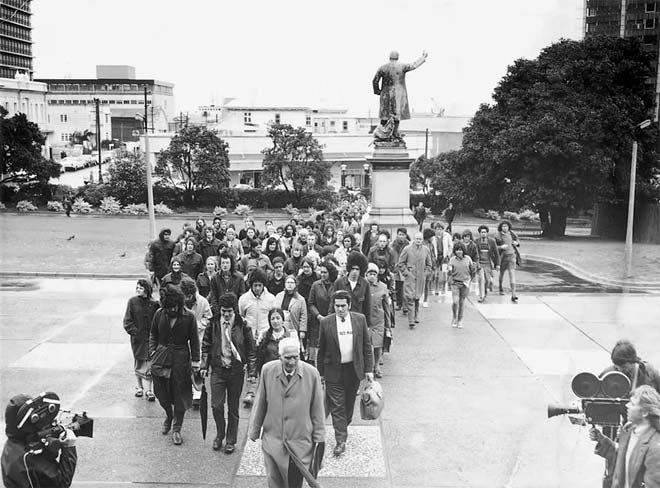Ko te mea tuatahi, E rere ana te mihi manahau ki ngā tūtutu kaurewa ō te petihana reo Māori, nā tā koutou manawanui i whakahoki mai te reo ki te mata o tōku arero. No reira aku mihi matakuikui kei aku manu whititua ō te reo rangatira. Tēna koutou katoa.
“You cannot take the reo and leave behind the tikanga.”
Each of these words, chiseled into the minds of the tauira from my te reo class, and not always in the kindest way.
50 years ago today, te petihana reo Māori was delivered on the footsteps of Parliament. Signed by 30,000 New Zealanders and carried by e ngā manu whititua o te iwi Māori. This petition for te reo Māori to be taught in schools would shape the future of Aotearoa and change the lives of so many forever. Heoi anōi, it wasn’t just about Te Reo Māori, pēnei i ngā kupu o tōku kaiako.

“You cannot take the reo and leave behind the tikanga.” This was not an instruction, it’s just facts. The visionaries that delivered the petition for te reo Māori must have known this. Ki tōku nei whakaaro, this was not just a march to parliament for te reo Māori, this was a search party that set out to help find those of us lost to te ao Māori.
When you take up the wero to learn te reo Maori, inevitably you will be challenged to learn the tikanga of delivering your pepeha. Ko ______ tōku Maunga, Ko ______ tōku awa. As a Māori separated from his iwi, learning my pepeha was incredibly confrontational. I did not grow up on my whenua, or with my reo, and until very recently I hadn’t set foot on my marae, my tūrangawaewae. To proclaim a maunga that I had never even seen, as mine, was not just hard it was painful. No reira, I haere au ki tōku whenua, ka tahi ka piki au ki toku Maunga
Below is a part of my Pepeha I wrote while sitting on my Maunga for the first time.
Ka heke te ua
(The rain falls)
Ka whanake te koromaomao
(The steam rises)
Whanake ai mai i te whenua ō te iwi ara ko Ngati pikao.
(Rising constantly from the lands of Ngati pikiao)
Ko te ha puta tēnei a Papatuānuku
Ka toro ake tāna ha ki te tihi ō te maunga tapu ara ko Ohau Taupiri kia pūtahi ki a Rangi-nui ki reira.
(This is the breath of Papatuanuku, her breath reaches to the summit of the sacred mountain Ohau taupiri to join with Rangi-nui there.)
Ka heke te ua,
(the rain falls)
Ko ngā roimata enei a Rangi-nui, ka heke ngā roimata ki ngā wai mārie ō te awa ara ko Ohau, me te moana ara ko Rotoiti-kite- a Ihenga .
(These are the tears of Rangi-nui falling to the peaceful waters of lake Rotoiti.)
The tikanga of reciting my pepeha positions me in this world, it connects me to my tūpuna and them to me, and just as all parts of the natural world connect, it connects me to the natural world.
My Maunga is the mountain that sheltered my tūpuna throughout their lives, it shelters the bones of my tūpuna still, and one day it will shelter my bones too. My awa and moana are the oceans and rivers that fed and cared for generations of my ancestors. When I recite my pepeha I am recognising that I am a part of the natural environment, never separate from it. These places have cared for my tūpuna, and my ancestors cared deeply for these wāhi, and now I have a responsibility to care for them also. Te reo taught me that.
By learning te reo Māori, we learn about our Maunga, our Awa, our Whenua, and our obligations to care for them all. Because of a petition in 1972 I now know these things and thank those rangatira for that amazing gift. Nau mai matauranga engari whakakahune ana. (knowledge comes and goes but wisdom lingers)
Tēnei te mihi manahau ki ngā manu whititua o te Petihana reo Māori mo to koutou manawanui ki te reo rangatira. Tēna koutou tēna koutou tēna ra koutou katoa.
